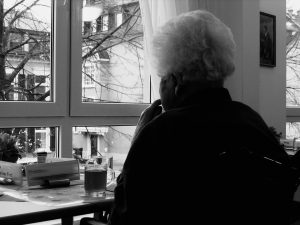A real treat today for me and for you. As you know, caregiver support and caregiving resources are two of my passions. And this article truly speaks to me as the community of care we were able to develop around my mother allowed her to stay in her home independently much longer than she would have without their support. Guest blogger Claire Wentz from Caring from Afar shares some helpful information about how to build that community.

Photo Credit: Pixabay.com
It’s hard to watch the woman or man who took care of you for so long become dependent upon you for basic care: making sure there are groceries in the house, checking for any wounds or bruising on their skin, changing the bed sheets, washing clothes, cleaning the house, managing money, and more. It’s even tougher when you live far away and you have to hope that your aged parent can still fix a meal or remember to take their medicine.
What’s more, these people don’t necessarily have to be your parents. They could be grandparents, aunts or uncles, or even older friends. In any case, if you live more than an hour away and you have been tasked with taking care of them, you are, according to the National Institute on Aging, considered to be a long-distance caregiver. And as Michael O. Schroederstates in U.S. News & World Report, the demand for caregivers is increasing as the population ages.
While you might feel you are the only one available to provide care, you actually do have allies who can help: your loved one’s neighbors. They can be your eyes and hands while you’re away, and they might need to do a little more than simply knock on the door once a day to make sure everything’s okay. You will need to enlist them to actively help care for your loved one.
If the neighbors have lived next door or across the street from your loved one for many years, getting them to help might not be an issue. However, if you don’t know them, or if they’re new to the neighborhood, you’ll need to introduce yourself and explain what you need. Here are some ways to set upa neighbor caregiving network.
- Introduce Yourself and Completely Explain the Situation
If your loved one is a parent and the neighbors have known you for years, this should not be a problem. However, for newer neighbors, or if the loved one isn’t a parent, you’ll need to pay a visit and tell them about your loved one’s condition. If the neighbor agrees to help but isn’t familiar with your loved one, take the neighbor over to their house and have them meet.
Generally, try to get help from the neighbors on either side of your loved one’s house and maybe two others across the street. If there is a church in the neighborhood, speak with the pastor or church secretary. They might be able to recruit a volunteer to join your caregiver team.
- Set Up a Meeting
Once you have your team set, hold a short meeting to discuss what is needed and which days each neighbor can check on your loved one. Prepare a list of daily tasksto perform. Ask the neighbors if they’re comfortable with performing such tasks as helping your loved one use the bathroom and cleaning up if there are any mishaps. Prepare a list of emergency numbers (your home and cell phone, the doctor’s, the pharmacy’s, each other’s, and another relative). Also, make sure they have your email address. Tell them when and how often you plan to visit. If they ever need to pay for something for your loved one, promise them you’ll reimburse them.
Don’t forget to give your allies small tokens of thanks for their help. Restaurant gift cards are always appreciated and welcomed.
- Consider Live-In Care and Other Resources
If your loved one is in a location where there aren’t any or many close neighbors, live-in care — or even moving inwith a roommate — might be the best option. According to the Huffington Post, you can use either a home health agency or directly hirea caregiver. Other resourcesinclude companionship services, meal programs, and even organizations that provide care for those with specific diseases such as cancer or Alzheimer’s.
You put a lot of yourself into the care of your loved one, but having a network of neighborly allies can ease the burden of caregiving if you live far away.
